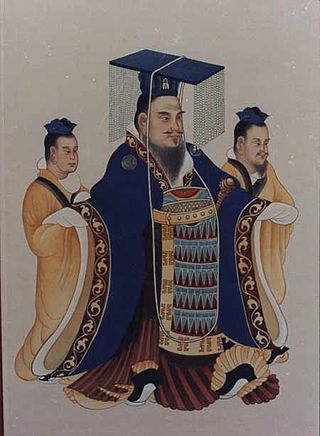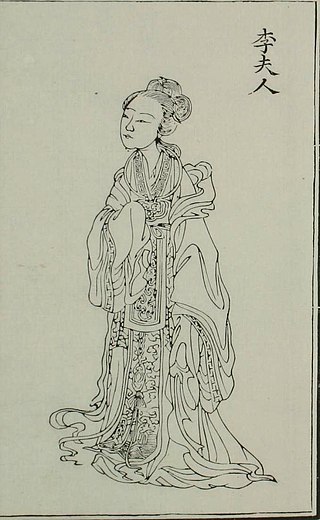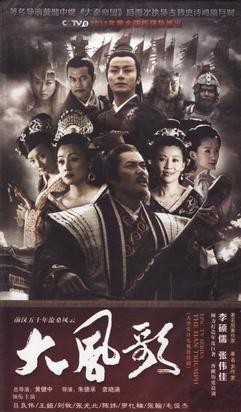The consort kin were the kin or a group of people related to an empress dowager or a consort of a monarch or a warlord in the Sinosphere. The leading figure of the clan was either a sibling, cousin, or parent of the empress dowager or consort.

Emperor Wu of Han, formally enshrined as Emperor Wu the Filial, born Liu Che (劉徹) and courtesy name Tong (通), was the seventh emperor of the Han dynasty of ancient China, ruling from 141 to 87 BC. His reign lasted 54 years – a record not broken until the reign of the Kangxi Emperor more than 1,800 years later and remains the record for Han Chinese emperors. His reign resulted in a vast expansion of geopolitical influence for the Chinese civilization, and the development of a strong centralized state via governmental policies, economical reorganization and promotion of a hybrid Legalist–Confucian doctrine. In the field of historical social and cultural studies, Emperor Wu is known for his religious innovations and patronage of the poetic and musical arts, including development of the Imperial Music Bureau into a prestigious entity. It was also during his reign that cultural contact with western Eurasia was greatly increased, directly and indirectly.

Empress Chen of Wu (孝武陳皇后), was empress of the Han dynasty and the first wife of Emperor Wu of Han. She was also known as Chen Jiao or as her milk name ChenA'Jiao (陈阿娇). She was born to Chen Wu (father) and Liu Piao (mother), also making her Liu Che's older cousin. Her given name Jiao means talented and beautiful and features in various Chinese poems and idioms.
Wei Zifu, posthumously known as Empress Si of the Filial Wu or Wei Si Hou, was an empress consort during ancient China's Han dynasty. She was the second wife of the famous Emperor Wu and his spouse for 49 years. She stayed as his empress for 38 years, the second longest in Chinese history. She was the mother of Emperor Wu's heir apparent Liu Ju and a great-grandmother of Liu Bingyi, as well as an older half-sister of the famed general Wei Qing, a younger aunt of Huo Qubing, and a step-aunt of Han statesman Huo Guang.
Wei Qing, courtesy name Zhongqing, born Zheng Qing in Linfen, Shanxi, was a Chinese military general and politician of the Western Han dynasty who was acclaimed for his campaigns against the Xiongnu, and his rags to riches life. He was a consort kin of Emperor Wu of Han as the younger half-brother of Emperor Wu's wife Empress Wei Zifu, and later the third husband of Emperor Wu's older sister Eldest Princess Yangxin. There is evidence to suggest that he was also a lover of Emperor Wu. He was also the maternal uncle of Huo Qubing, another decorated Han general who participated in the war against the Xiongnu.
The Grand Chancellor, also translated as counselor-in-chief, chancellor, chief councillor, chief minister, imperial chancellor, lieutenant chancellor and prime minister, was the highest-ranking executive official in the imperial Chinese government. The term was known by many different names throughout Chinese history, and the exact extent of the powers associated with the position fluctuated greatly, even during a particular dynasty. During the Six Dynasties period, the term denoted a number of power-holders serving as chief administrators, including zhongshun jian, zhongshu ling, shizhong, shangshu ling and puye.

The Emperor in Han Dynasty, also released under the title The Emperor Han Wu in some countries, is a 2005 Chinese historical drama television series based on the life of Emperor Wu of the Han dynasty. It uses the historical texts Records of the Grand Historian and Book of Han as its source material.

Romance of the Three Kingdoms is a Chinese television series adapted from the classical 14th century novel of the same title by Luo Guanzhong. The series was produced by China Central Television (CCTV) and was first aired on the network in 1994. It spanned a total of 84 episodes, each approximately 45 minutes long. One of the most expensive television series produced at the time, the project was completed over four years and involved over 400,000 cast and crew members, including divisions of the People's Liberation Army from the Beijing, Nanjing and Chengdu military regions. Some of the dialogues spoken by characters were adapted directly from the novel. Extensive battle scenes, such as the battles of Guandu, Red Cliffs and Xiaoting, were also live-acted.
The Old History of the Five Dynasties was an official history mainly focus on Five Dynasties era (907–960), which controlled much of northern China. And it also includes some history of other south states during the era. It was compiled by the Song dynasty official-scholar Xue Juzheng in the first two decades of the Song dynasty, which was founded in 960. It is one of the Twenty-Four Histories recognized through Chinese history.

Three Kingdoms is a 2010 Chinese television series based on the events in the late Eastern Han dynasty and the Three Kingdoms period. The plot is adapted from the 14th century historical novel Romance of the Three Kingdoms and other stories about the Three Kingdoms period. Directed by Gao Xixi, the series had a budget of over 160 million RMB and took five years of pre-production work. Shooting of the series commenced in October 2008, and it was released in China in May 2010.

Initiating Prosperity is a Chinese historical television series based on events in a period in Chinese history known as the Transition from the Sui dynasty to the Tang dynasty. The series was directed by Wang Wenjie and starred Shen Xiaohai, Liu Wenzhi, Zhang Zijian, Sun Feifei and Bao Guo'an. It was first broadcast on television stations in China in 2006.

The Patriot Yue Fei is a 2013 Chinese television series based on the life of Yue Fei, a Song dynasty general widely regarded as a patriot and national hero in Chinese culture for his role in defending the Song empire against the Jurchen campaigns. While the plot is based on historical sources, it also includes elements of fiction and draws ideas from the novel General Yue Fei (說岳全傳) and other folktales on the general's life.

Lady Li, also rendered as Li Fu-jēn, was a Han dynasty concubine of Emperor Wu. Civil unrest broke out between her family and Wei Zifu's family. Moreover, her siblings defected to the Xiongnu and became traitors to China. As a result, Emperor Wu ordered her relatives to be tried and executed, leading to the downfall of her and her family.

The Han Triumph, also known as Wind Ode, is a Chinese television series based on historical events in the early Han dynasty, beginning with the founding of the dynasty by Liu Bang after his triumph over Xiang Yu, and the events leading to the reign of Liu Heng. Directed by Huang Jianzhong, the series starred Ray Lui, Wang Ji, Liu Mu, Zhang Guangbei, Chen Wei and Li Qingxiang in the leading roles. It was first broadcast on CCTV-8 in China on 17 December 2011.

Tang Ming Huang is a Chinese television series based on historical events in the reign of Emperor Xuanzong of the Tang dynasty. The series was directed by Chen Jialin and starred Liu Wei as the eponymous emperor. It was first broadcast on CCTV-1 in 1990 in mainland China.
The Eloquent Ji Xiaolan is a Chinese television series about the life of Ji Xiaolan. The series was directed by Zhang Guoli and consists of a total of 173 episodes shot in high definition, each 45 minutes long and containing 10 minutes of 3-D effects. The series is based on events during the reign of the Qianlong Emperor in the Qing dynasty.

The Seven Heroes and Five Gallants is a 1994 Taiwanese television series produced by Chinese Television System (CTS) a few months after its prequel Justice Pao, which was also produced by Chao Ta-shen. Dozens of actors appeared in both series, but only Sze Yu and Tu Man-sheng reprised their roles. Fan Hung-hsuan and Lung Lung chose to portray new characters rather than their iconic roles.

The Advisors Alliance is a 2017 Chinese two-part television series based on the life of Sima Yi, a government official and military general who lived in the late Eastern Han dynasty and Three Kingdoms period of China. The series starred Wu Xiubo as the main character, with Liu Tao, Li Chen, Janine Chang, Tang Yixin, Yu Hewei and Wang Luoyong playing supporting roles. The first part of the series started airing on Jiangsu TV and Anhui TV on 22 June 2017. The second part started airing on Youku on 8 December 2017.
Dongfang Shuo is a 2008 Chinese historical and biographical television series centered on Dongfang Shuo, a Han dynasty scholar-official, fangshi, author, and court jester to Emperor Wu. It is based on the novel Wisdom Holy Dongfang Shuo by Dongfang Longyin. The series was jointly by China Central Television, Beijing Film Academy and Guangdong Donghexing Recording and Video Company. The series stars Cheng Qian as Dongfang Shuo, the rest of the main cast includes Jin Dong, Hu Ke, Qin Hailu, Yu Xiaowei, Liu Xiyuan, Hu Yajie, Tao Huimin, and Zhang Lingxin. It originally aired on CCTV-8 in August 2008.












